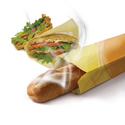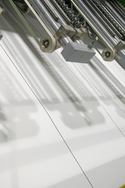Relationship building
10 May 2012Converters are working hand-in-hand with paper and board suppliers to be as flexible as possible, in order to achieve best outcomes in the development of new grades. Sally Cousins reports
Brands and retailers want more from their paper and board grades, so producers are upping their game with product development – aimed at giving converters the best products to win over customers.
At the heart of this is excellent communication to identify emerging trends. End-user collaboration is a process that Korsnäs has worked hard at and has resulted in the recent development of its lighweight Korsnäs Artisan cartonboard, developed in partnership with leading quality retailer Marks & Spencer.
Korsnäs end-user director Darryl Rice explains: “It is all about evolving a product due to different areas of demand. The development process is linked to our end-user management approach and exploring how we can use a product to match the demands of the market and our customers’ customer.”
Korsnäs Artisan is the result of two years of developmental work to produce a unique type of cartonboard that fits in with Marks & Spencer’s premium packaging requirements and rigorous environmental ethos.
Marks & Spencer was looking for a cartonboard that created a rustic effect specifically for a range of homestyle cakes and wanted a board that was tactile but also supported quality print.
Made from 100% virgin fibre, Korsnäs Artisan is a specially designed multi-layered cartonboard with a light-coated top surface and an uncoated reverse side. The board’s composition of long resilient fibres is said to provide a robust packaging material, while the super-smooth and silky exterior offers excellent printing properties.
By using Korsnäs Artisan, which is fully compostable and FSC approved, Marks & Spencer achieved a 5% material weight reduction compared with using its previous supplier, without any loss of performance.
With new product development comes huge investment. Developing a new product for a gap in the market isn’t a straightforward process and can take years of research and development. Extensive trials are needed and this all has to be built in to the scheduling of a mill’s production capacity.
Stora Enso agrees that it is essential to take time and incorporate product development into a hectic production schedule. The company has recently launched enhanced versions of its Performa White, Performa Bright and Performa Cream cartonboards.
Product manager at its Fors Mill in Sweden, Eva Lunqvist, comments: “By listening to both printers and brand owners we focused our development work on the key properties of strength and printability.”
She adds: “Feedback from commercial trials was extremely positive. The printability has improved considerably, thanks to the board’s enhanced coating and smoothness.
The increasing demand for shorter runs from converters is also driving suppliers to incorporate this into a mill production schedule.
According to Sappi, being flexible is key to the launch of new products and although it is obviously more cost-effective for a mill to produce long runs, being able also to offer customers smaller volumes is a trend that it’s also embracing.
Sappi’s marketing manager new business Kerstin Dietze says: “Sappi’s speciality is very flexible, customer and service orientated. We have five paper machines answering these trends. We can arrange a customised product in relatively small volumes. Delivery specification can be absolutely flexible whether it is sheet or reel and in either reel width or format.
“Every customer can have an order adapted to their needs.”
The development of Fusion, Sappi’s new generation top liner, is an example of a company listening to what converters want. The premium quality, high bright white liner uses 100% virgin fibres to ensure it is a spotless paper. Dietze cites a number of key factors that are central to Fusion’s appeal: “High brightness and whiteness afford excellent colour reproduction, while the high performance on converting lines ensures smooth and fast production.”
Communication with converters was essential. Dietze adds: “When developing Fusion and other products we have always involved industry partners such as paper chemicals suppliers and converters.”
The strength of these relationships has been key for trialing how a product will work on the machines. For Sappi, relying on a selection of leading converters to trial run and test the product is a key component in the product’s future success. Sappi Fine Paper Europe’s product manager Lars Scheidweiler says that although it relies on its own print and finishing experts, ultimately it is the market that decides if it has a breakthrough. “If these critical customers are OK, we know 99% of the industry will be happy, and we are also working together with brand owners.”
The push towards just-in-time and flexible deliveries has meant the paper and board industry having to respond. Metsä Board has recognised that frequent promotions requiring a quick response, lean manufacturing practice and the tendency by many converters to reduce unnecessary stocks or avoid them completely, means that paper and board producers have had to adapt.
Metsä Board’s Olli Mäki, vice president of cartonboard sales, comments: “We are aware that converters face challenges today that result in demand for shorter runs.” As a result, the company has an Express Board service available across Europe, which offers shorter lead times and small order amounts. It includes customised sheet sizes converted to order and flexible sales order quantities, from one tonne up to 20 tonnes per order line.
Mäki adds: “We currently have two new sheeting projects underway, one at our Äänekoski mill in Finland; the second at our Gohrsmühle mill site in Germany where we are converting some existing sheeting machinery to folding boxboard sheeting use. The Gohrsmühle express sheeting service will make it possible to combine different kinds of deliveries to customers.”
The company anticipates this should be completed by autumn 2012 and will help to reduce lead times for sheeted board. However, Mäki adds: “We are aware that the market doesn’t stand still and will continue to look at further developments to our service in consultations with customers to ensure they receive the best and most appropriate service in the future.”
Product consistency is also an issue. Knowing that quality is consistent and reliable is essential. This is an area that Metsä Board has addressed through its self-sufficiency in fibre supply. Mäki explains: “The wood Metsä Board uses is predominantly sourced locally from the forests close to its mills in Finland. We are self-sufficient in fibre supply, instead of depending on market pulp, which also helps ensure the consistency of our boards. This provides assurance that they will perform well in both printing and converting with fewer stoppages and waste.”
He adds: “It is also vital for a board manufacturer to have very strict limits for variation in quality at the mill. Variations in thickness lead to inconsistency in printing results, as well as stoppages and waste in converting and packing lines.
The company has tightened its tolerances to be what Mäki feels is the “tightest in the trade”, to ensure even better consistency in board quality. “In board thickness we aim for consistency with a target value of plus or minus three per cent, compared to the five per cent considered the norm in the industry.”
Paper and board producers are also continually improving their environmental status to meet demands from brands and retailers, who are keen to demonstrate they are choosing to use environmentally sound material for packaging.
This is a trend that UPM has recognised. It feels that sustainability and environmental issues are becoming more and more important for paper customers and the trend in the European markets favours affordable, well-functioning papers without compromising on environmental performance.
Its recent development of its UPM SwanBarrier product was based on continuous customer feedback during the whole project. Food wrappings have traditionally been made of either plastics or paper and plastics composites. Now, according to UPM, there is growing interest in the retail sector for recyclable and biodegradable packaging materials instead.
“These customer needs provided one starting point for our product development,” says Petri Hakanen, production unit director, speciality papers, Jämsä River Mills. “Another came from an examination of existing product properties and possible means to build these into the paper without using non-degradable components.”
Iggesund is embarking on an impressive environmental investment program, which it feels reflects its belief in the future success of the board market. The company plans to invest €235 million at its site in Sweden, and £108 million in a biomass boiler at its Workington mill in the UK, where its Incada brand is produced, as part of a programme to lower fossil carbon emissions and to begin operating exclusively on biofuels at both plants by 2013.
Iggesund’s Staffan Sjöberg concludes: “It is interesting to see the growing awareness of end-users. We see every converter we are working with coming to us with a questionnaire about everything, including the origins and even the name of the person who planted the tree 80 years ago.
“End-users’ awareness is already higher, and this creates a lot of work for us. But it is easy when you already have an environmentally sound mill.”
Jumbo reels in the dry end of Board Machine 4 at Stora Enso's Imatra Mills in Finland. BM 4 produces liquid packaging board used in gable top formatted milk and juice cartons Board Machine 4 at Stora Enso's Imatra Mills Sappi's Fusion top liner is also helping printers and converters to operate more efficiently and prevent materials waste, saving them time and money Sappi's Fusion UPM SwanBarrier is a barrier paper range for food wrappings as an alternative to plastics, or paper and plastics composites UPM SwanBarrier Metsa Board has honed its tolerances to be the "tightest in the trade", and to ensure even better consistency in board quality Metsa Board External weblinksConverting Today is not responsible for the content of external internet sites.Iggesund Jet Europe Korsnas Metsa Sappi Stora Enso





